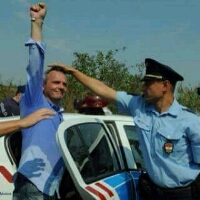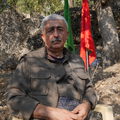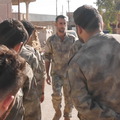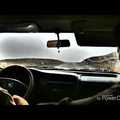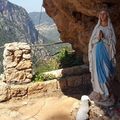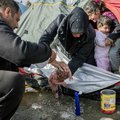Greek drama
Heydat from Afghanistan was the first person I met on Lesbos. He was sitting in front of the Blue Sea Hotel. His brother-in-law addressed me, asked for a light. That's how we started talking. Heydat's brother-in-law lives in Belgium. He flew to Greece the moment he heard what had happened. The conversation started somewhat reluctantly and stayed that way until the end. I myself could hardly understand what I was hearing.
-The „agent” in Turkey promised a big, safe ship. One to which even lifejackets weren't neccessary. It was more expensive, that's true, he asked for 3200 dollars per head, but we thought it's worth it for the sake of the children.
Heydat quietly and a little bit haltingly tells the story of that particular day of 28th of October. He's not looking at me, just starkly stares in front of himself.
- Then the ship started off, with more than three hundred people crowded on it. The smuggler driving the ship has boarded to another ship at halfway. We were left there on our own and the big waves tripped the ship. Zohra, my wife was pregnant, in her eighth month. She's gone missing. Now they told they found a woman's body on the beach. They'll go soon to the hospital to identify. It is told to me by Heydat's brother-in-law that the three years old Abubakar is also lost. He wasn't found yet either. The bigger son was a four and half years old boy. He died in Heydat's hands in the water.
We are some days after the tragedy of 28th October. They still find bodies drifted onto the shore. Mostly children. There's nobody to identify them. At the moment even the exact numberof people who died at the sea, is not clear. Even the tragedy's details are coming together in small pieces. On that day the sun was shining, but a very strong Northeastern wind was blowing. The weather front has arrived the day before and the strength of the wind kept growing. Alongside it the waves too. At the Northern shore of Lesbos, on the otherwise quiet sea, the waves were high too. The strait here between Lesbos and the Turkish shore is ten kilometres wide.The tall mountains on the Turkish side make this part protected from the wind and the relatively small distance between the two banks makes this the most important refugee route between Turkey and Greece. The refugee boats arrive to Greece on the ten kilometres long beach between Sykaminea and Mithimna. There wouldn't have been any problem with the ship that sank on 28th of October despite the large waves- hadn't it been overfilled at least threefold. But according to current informations, instead of a hundred people, at least three hundred were crowded onto it. Then “falling” from one wave, the upper deck of the overloaded ship fell off. At this point did the smuggler ask for help that have arrived duly. But the smuggler wanted help only for himself. The other ship, onto which the smuggler transferred, even hit the refugees' ship. By then there was serious panic on the deck. The refugees tried to climb to the ship that came for the smuggler. At this point the smugglers took out their weapons and kept the panicking refugees at bay with warning shots then quickly cleared off. The abandoned ship had not the slightest chance to reach the Greek beaches.
Geraldo is a Spanish professional, member of a sea rescue organisation. The people of Proactiva are here for weeks by now, equipped with jetskis and help if there's any trouble.
- It was around three p.m. when we received the call on radio, that there's some big trouble. Local fishermen already saw the ship closing in. They were watching its movement then warned that the ship has disappeared. Our colleagues immediately got into car and went up to a rock along the shore, meanwhile the four of us put the jetskis onto water the same instant.
The special high-performance jetskis hold a rubber table on their backs, held by a metal frame some centimetres above water. Proactiva's men on the hill were using binoculars to find the location where the refugee ship sank. It was clearly visible despite the high waves that a lot of people were in the water
-The colleagues were directing us through radio to the site of the catastrophy. We didn't see anything on the water so couldn't find the place due to the big waves.
Naturally it wasn't simple to get to the victims. “Under normal circumstances” members of Proactiva work on a two hundred meters long strip next to the beach. In Spain local councils are responsible for that much territory on the beaches of holiday resorts. And Proactiva is a company that handles the “guarding” of such coasts. But here they had to work far in, kilometres from the coasts, amongst meter-high waves.
-By the time we arrived there were two ships from Frontex and the Greek coastal guard. The only problem was that these ships are too high, too big and they could pull out people from the sea only at the low platform at the stern. Moreover they can't go near them. The sea at the site of the sinking of the ship was full with desperate people waiting for a miracle. There were ones in lifejackets and ones without them. They clearly had no idea what to do in such a situation. Instead of forming circles and waiting for the rescue while holding each other's hands and supporting each other, everybody was struggling with the elements and tried to survive.
- Of course here comes the situation that's the hardest. Those with a chance to survive have to be rescued. I saw children with their faces down, those who had their heads in the water...So those have to be left already. There's no chance in their case. Those have to be pulled out who can still be saved.
Two out of Proactiva's four men immediately went to the platform of the coastal guard. The other two pulled refugees out with the jetskis, who, in their mortal fear, tried to climb onto the back platforms of the jetskis in increasing number.
- Some have grabbed my ankle and didn't let go. It was terribly hard and dangerous to help so many people struggling for their lives. I had no clue how long did it take, and sometimes I was thinking I'll get lost there too. I know that we pulled hundreds of people from the water and my colleagues used heart massage and mouth-to-mouth on people on the ships.
The rescue went after dusk as well. Though nothing could be seen at that time. Only what was lit by the searchlights of the coast guard's ships. What's sure is they pulled out from the water whomever they found, be they alive, half or completely dead. Nobody knows even now, how many have died there.
The dead are brought to the capital of the island of Lesbos, Milini's hospital. Here's a donated freezing container. Those wait their fate here, who weren't identified yet. There are around fifty bodies here. Previously they were buried, but the city's cemetery has became full. The cemetery is at the hillside. It's size is enough for a twentyfive-thousand people big city. Small. There's a parcel in the back, in a free corner. Untidy heaps of dirt, on them broken pieces of marble slabs with handwritten dates and only one word more: “agnostos”- unknown.
Some days after the tragedy of 28th October nice weather kicked in. Sparkling sunshine and lull. The weather on the northern beach is even quieter than usually. I set out early morning on monday on the gravel road. The road follows the coastline. Somewhere quite close to the water, elsewhere climbs onto the rocks with sharp hairpin bends. At one of these, it can be seen, that they are coming. One nearby, two- no, four a bit further. The rubber boats are red due to the lifejackets of the refugees sitting in them.By the time I get to where they are landing, one boat is already on the shore. They're helping ashore a man in wheelchair. Then comes the second, third ship. In five minutes. Everyone endures the excitements differently. There are the technocrats, the strong, who may have seen sea before. They are unwrapping their dry clothes from clingfilm. I step to a beefy man. He is hugging his wife, who is pulling out the dry stuff with shaking hands. Farzin speaks German excellently. I din't even ask where they're heading.
-We're Iranians.
-Iranians?
-And from there why?- I'm puzzled.
-Well because of this,- cuts in Farzin's wife and reaches into her jumper to pull out her necklace which holds a cross.
-Yep,- shrugs Farzin. -That's what we have. It's not fun and games, being Christian in Tehran.
Though as it turns out they won't have a very difficult time starting a new life. Farzin's brother has been living in Frankfurt for around twenty years now.
By the time we stop the chatter three more boats land around. In half an hour's time. Five. Or rather six. I stop counting at ten. And this is just a three hundred meters long part of the ten kilometres long northern beach. And it's barely past ten a.m. I help ashore the youngest refugee. A ten days old little girl. I give her back to his father. He stands in front of the camera and smiles. The child sleeps. Like children of ten days usually do. This goes all day. On the beach there are only volunteers. Volunteer ashore-pullers, volunteer doctors, volunteer humanitarian workers. There are two collection points. Here those who are completely soggy can change the wet clothes. Shoes are the most sought-for. Nobody's here to represent the Greek authorities or the European Union. Only those are here who think these refugees are humans after all. And of course the big help, the large amount of the refugees easily brings momentary chaos with itself. Especially when a ship arrives and everybody wants to help.
Then when night falls, nothing can be seen. No information about when the next boat arrives. I can catch the moment when two ships reach shore in the thick darknes completely by accident. Two of us were there. Apart from me a Dutch guy, who has mounted a ship radar onto his car and tries to spot where the next rubber boat arrives. The two boats, approximately hundred people, arrives to the same spot with two minutes' difference.There's nobody to receive them. No thermo blankets, doctors, cars. Only us, who try to help. Pulling the wet people up on the steep side of the beach. A woman is laid onto the ground who simply fainted from the excitement. Then regains her consciousness, stands onto her feet and starts sobbing.
Adil, the Iraqi Kurdish man simply gets a shock. He can't stop talking. He tells in ten seconds that he is a filmmaker too. Instructs Gábor a bit, that in fact he should shoot the scene with optics sized 16, if possible, 1.2 brightness, because that's how it'll be good, meanwhile jumps onto our necks three times and introduces himself, then returns to the advantages of the wide-angled optics in such situations.
On the way back home on the coast when the car's headlights hit the beach, the lifejackets left on the coast are shining redly. The piles of lifejackets that the local council can't clear away. Impossible. Every morning a ramshackle lorry arrives, then gets full after the first three hundred meters. The coast is covered by deflated rubber boats and lifejackets. A surreal sight.The motors are quickly dismounted by the locals after landing. The floorboards of the boats are taken out. The boats are of bad quality, they stay. Most of them deflates already on the way. They are made for this end. There are different estimates in Turkey about how much money did the refugee crisis generate so far. The numbers vary between somewhere forty and fortytwo billion Euros. (That's 40 percent of Hungary's yearly national product) This counts from the human traffickers through the organisers of the transports up to the hotel owners. A complete industry, containing those who manufacture the rubber boats, of course in such a quality that it can tiptoe to the first island, like the Chinese boat engines ordered by the dealers by the tens of thousands, or the fake lifejackets that are a story on its own. In any Turkish seaside town if somebody moves on the street with a packed but still movable garbage bag, that's a refugee, who is on his way towards the sea transport. Inside the garbage bag are the lifejackets. Usually fake ones. Lifejackets can be distributed only with certificates, on any point of the world. And with the information about what is lifejacket and what is just swimming aid. It's difficult, I know. Most refugees wear bad quality, fake lifejackets, often stuffed with paper or sponge. Because that's the cheap one. This can be bought for example in every doorway in the downtown of Izmir. These stand in piles at the Northern beaches of Lesbos. As long as the boat doesn't tip over, the thing is fine enough. Troubles start when it does. Because then nobody will be saved by these jackets.
There are two bigger camps on Lesbos. Kara Tepe and Moria. Both in the vicinity of the capital, Mitilini. The refugee families are taken to Kara Tepe. And the single men can go to Moria. Which is not a camp. They have to come here to get the paper that proves that they have registered to the Greek and the EU system. Because here are the workers of the Frontex. A more hopeless place than Moria maybe doesn't even exist for an outsider. Theoretically the registration is fast, but depending on how many people are in the line the wait can be two days long. And until then there's nothing but the filthy hillside with the stripped olive trees, whose branches have been torn off and burnt. And not a single drop of rain has fellan for days by now. I actually don't want to imagine how Moria looks like when it's raining. At the bottom of the hillside are buffet cars and traders selling tents, sleeping bags, blankets. Not cheaply. People have to wait for registration here. Then when they have the paper, they can go to the city and stand in the queue for a ship ticket.
The ship ticket to Athens is fortyfive Euro fifty Cents. But here the Athens Idomeni bus ticket can be bought here at once. That's fifty Euros. I've just stumbled upon the strike of Panhellenic Maritime Alliance- that's the name of the trade union of the maritime workers. Their pension fund has been stolen, at least they think so, and announced a two days strike that has become four days. But meanwhile the refugees kept coming because the union of Turkish human traffickers, utilising the good weather, kept pushing the people through the strait. On the third day of the strike around fifteen thousand refugees were looking for a piece of ground for themselves in Mitili. The town has in normal times twentyfive thousand inhabitants. The hotels were full, there was no room left in the harbour, people were sleeping under the arcades. Fires fed by plastic bottles were burning, with people warming around them, lying in sleeping bags and on blankets, preparing for the night.
I don't know how but I've managed to get an airplane ticket to Athens, under the counter, expensively of course. Take off on Thursday noon. In the morning we went to drink a coffee. On the abandoned seaside road I didn't understand why was the car in front of me so lame. The driver was staring at the sea. A refugee boat was tumbling on the water. We stopped. It was clear they were in trouble. It was surprising, because few refugees are arriving to the Eastern shores of Lesbos. The Turkish coasts are far from here and usually a strong wind is blowing, waves are big. Nevertheless this boat was here, like a vision on an early morning. Then a man turned up in the water. He was swimming towards the shore. Then as the boat turned, a bit further were two more. All of them struggling with the waves. By this time many people stopped here. Somebody called the coast guard. The Greek prime minister's convoy stopped at this moment. Alexis Tsipras' plane landed a few minutes earlier. The convoy stopped, some people exited the car. By the time we would've reached them running they weren't there.They stopped for at least thirty seconds. With Tsipras there was Martin Schultz, vice president of the European Parliament. Together they took a quick look at the refugee crisis, saw the many people on the beach and the blokes struggling in the water, noted then dashed. And in these thirty seconds there was everything. Everything that characterises this crisis in small and at large. The self-confidence of taking a look, the convicton that everything is all right, the hurried slamming of car doors, the discreet little cloud of dirt left behind them. The details, the little strokes of the brush, there they were, all of them. Then of course the Syrians in the water were helped ashore, one of them shivering, totally cold, the other one was in better strength, got dry clothes immediately. There won't be much trouble beyond this point, he smiled to everyone. He registers six or seven times into uncoordinated databases and gets to the Northern part of Europe in no time.
(The project is part of the Transatlantic Leadership Initiative” (TLI) and was made possible by support from the German Marshall Fund of the United States.Opinions expressed in this publication do not necessarily represent those of the German Marshall Fund of the United States, or its partners.)
